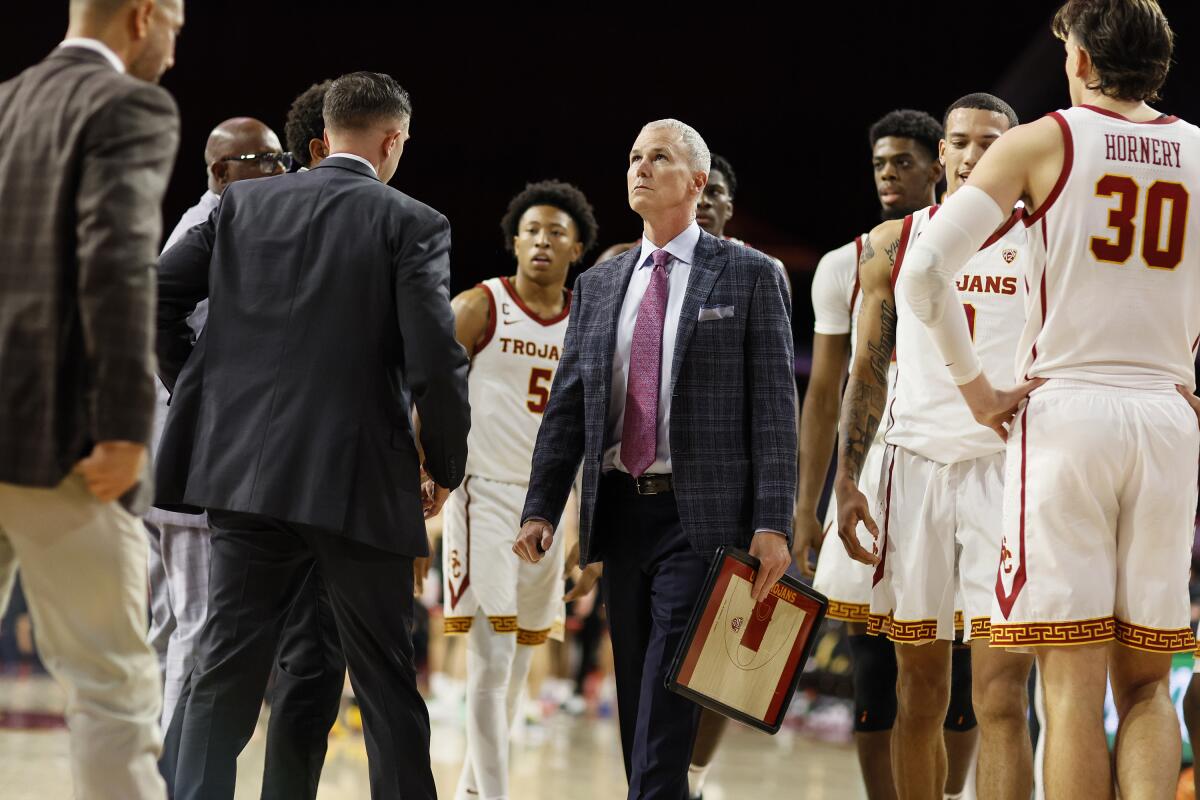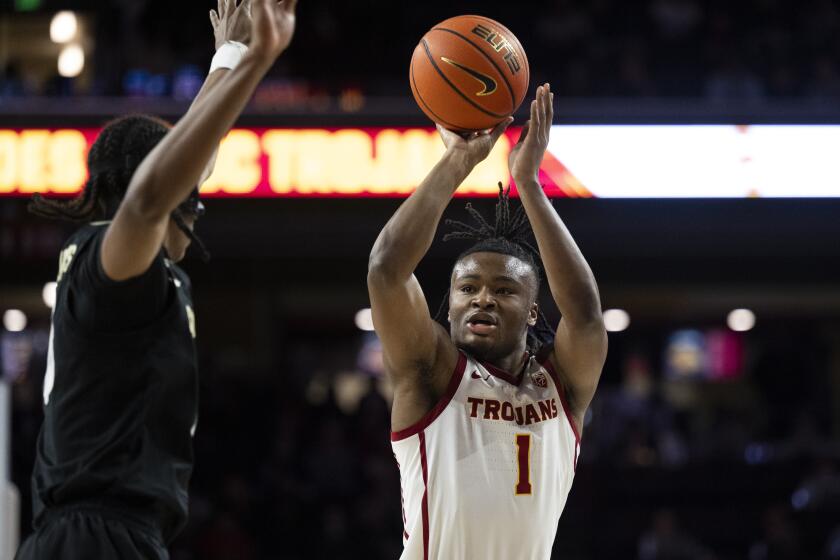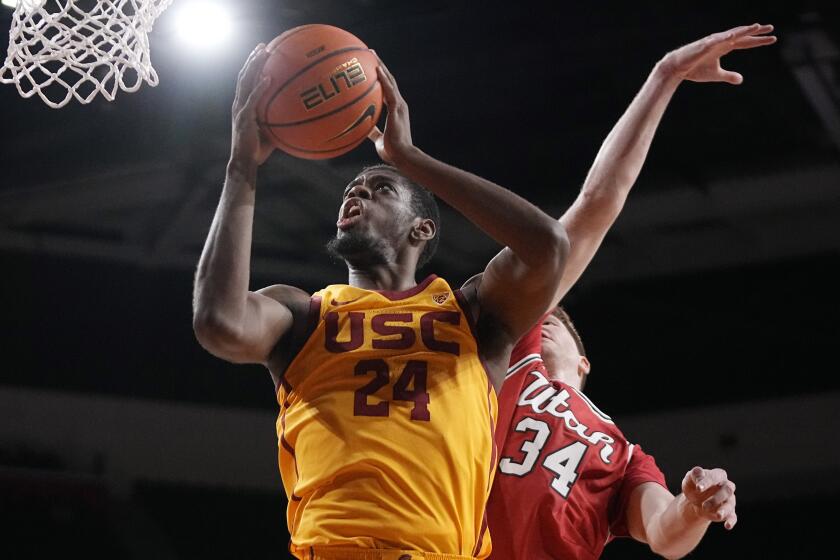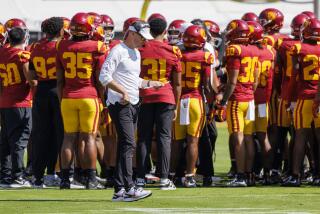USC knows rebounding ‘is not necessarily natural for a lot of guys.’ How to fix it?

After a sixth consecutive loss, Andy Enfield’s patience appeared to be wearing thin. USC had just given up 17 offensive rebounds in a nine-point loss to Oregon at Galen Center. The previous game, the Trojans got outrebounded by 14 against UCLA at home. The coach, often so calculated in his media appearances, called his top four post players “poor” defensive rebounders. He yearned for USC’s big men of old. He missed their toughness.
Three weeks later, when asked where his players stood in terms of toughness required to battle on the boards, Enfield paused in a mostly empty practice gym. He considered his words carefully.
“They work hard, they’re trying to be tough,” the coach said, “but the rebounding thing is not necessarily natural for a lot of guys.”
The Trojans (10-16, 4-11 Pac-12) are the second-worst team in the Pac-12 in rebounding margin. They’re running out of time to address the glaring issue with five regular-season games left, starting with Saturday’s rivalry rematch against UCLA at 7 p.m. at Pauley Pavilion.
The Bruins (14-12, 9-6) outrebounded USC 43-29 on Jan. 27 in a 15-point UCLA victory at Galen Center, their first road win over USC of coach Mick Cronin’s tenure. It won’t be easy for the Trojans to get revenge. They have lost seven consecutive road games, their longest road losing streak since 2015. USC has lost two straight games at Pauley Pavilion.
Boogie Ellis fired an airball at the final buzzer as USC lost to Colorado 92-89 in double overtime for its second loss to the Buffaloes this season.
But after blowing a 16-point, second-half lead to Colorado, guard Boogie Ellis called the rivalry rematch a “must-win.” The Trojans are hoping to find any semblance of momentum entering the Pac-12 tournament, which they know will be their only hope for an NCAA tournament berth.
Last weekend could have provided the perfect launching point. A thrilling win and last-gasp block by Joshua Morgan against Utah appeared to give the slumping team confidence. Losing to Colorado in double overtime was a gut punch, but the Trojans tried to find a silver lining while preparing for UCLA.
“Just play like we did versus Utah and Colorado,” forward DJ Rodman said. “But just rebound.”
The Trojans have been outrebounded by an average of 18.25 in the last four games, including 27- and 25-rebound disadvantages against California and Colorado, respectively. It’s been an Achilles heel for the team all year, Morgan admitted.
Morgan leads the four-man post rotation that includes 7-foot-1 center Vincent Iwuchukwu, 6-9 sophomore Kijani Wright and freshman Arrinten Page. They have a combined 18 defensive rebounds in the last four games. None has pulled down more than two in a game.
“Some of our bigs are very good offensive rebounders, not so much natural defensive rebounders,” Enfield said. “Working at it, getting better, but we need them to improve, and then some of our guards, same thing.”
Defensive rebounding is a combination of technique, mentality and anticipation, Enfield said. The team continues to work on physicality drills in practice. Morgan, a 6-11 forward who leads the Pac-12 in blocks but averages a paltry 1.8 defensive rebounds per conference game in 21.1 minutes, has tried to focus on making sure he hits the opposing post player first after each shot. The 6-6 Rodman leads the team with 4.9 rebounds per game.
Making a late-season push on the boards is USC’s next task after tackling its turnover problem.
Joshua Morgan blocked a potential tying shot by Utah’s Deivon Smith in the closing seconds to help secure USC’s 68-64 victory.
The Trojans had double-digit turnovers in 13 of their first 14 games. The struggles prompted the coaching staff to start tracking turnovers during practices, awarding points during each scrimmage for made baskets or turnovers forced. The team that lost had extra wind sprints at the end of each practice. The immediate feedback of seeing their mistakes tallied on the board, combined with the consequence of extra conditioning, made a bigger impact than simply reviewing the practice film a day later, said Enfield, who uses the system to track and penalize offensive rebounds given up during practice.
The strategy worked until injuries knocked out the starting backcourt. During the three games without Ellis and Isaiah Collier, USC had 42 assists to 50 turnovers. But since Collier’s return from a broken hand, USC is averaging 8.5 turnovers in the last four games compared to 12.7 on the season.
Much of USC’s preseason hype was built on the talented backcourt. Languishing at 11th place in the conference, the Trojans recognize they fell well short of expectations that placed them second in the Pac-12 preseason media poll. But getting Collier back makes them whole at the right time with the team preparing to go all-in at the conference tournament.
“We were one of the favorites to win at the beginning of the year and we still have the same team,” Rodman said. “I don’t know why that’s not a possibility.”
More to Read
Go beyond the scoreboard
Get the latest on L.A.'s teams in the daily Sports Report newsletter.
You may occasionally receive promotional content from the Los Angeles Times.









